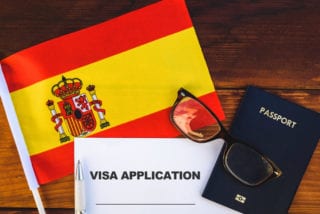 Work Visas in Spain
Work Visas in Spain
Are you dreaming or planning to move to Spain? Beautiful weather, golden beaches, friendly people, and rich local culture are incredibly appealing; therefore, there’s no surprise that Spain is the 2nd most visited country in 2020, with an estimated 82,7 million arrivals that year! If Spain is on your list of places to live, then you may wonder if you can also work there. Find out if you need a permit to work in Spain and the procedures for applying for your different types of Spanish work visas.
Who Needs a Work Visa in Spain?
In short, anyone who is not from EU countries needs to obtain a Spanish work visa to live and work in Spain. Without a work visa, a company cannot legally employ non-EU citizens, nor can a freelancer remain and work in Spain. Work permits, which may be limited to specific activities, are in general valid for a year and are renewable if you still fulfill the conditions. After five years, you can apply for a long-term residence permit in Spain.
Read: Health Insurance in Spain for Expats and Working Abroad
Types of Work Visas in Spain
There are various types of work visas for Spain for different jobs and different lengths of employment. In most cases, you must arrange a job before applying for a work visa to move to Spain. Please also note that the Spanish work visa is linked to your residence status in Spain. The most common Spanish work visas are:
Highly-skilled Employee Work Visa
To work in Spain as a highly-skilled employee, non-EU citizens need to find a job listed as a ‘Shortage Occupation’. This is a list of occupations for which there is a lack of suitable candidates within the EU and gives you the chance to apply for that job. Some of the fields on the “in-demand” list are doctors, marketers, engineers, business consultants, etc. Once you get a job, but before moving to Spain, your new employer requests a work visa from the Ministry of Labour.
From there, your employer will guide you in the process of getting the work visa and residency permit, which can take up to eight months. Once your visa gets approved, the embassy or consulate will issue you the work visa and residency permit. You will need to pick it up before entering Spain. The Spanish work permit is valid for one year and is renewable as long as you fulfill the conditions.
Seasonal Work Visa
The process of obtaining a season work visa is very similar to a highly-skilled employee work permit. Also, in this case, the employer has to apply for a visa for you. However, you need to show some additional documents to support the application, such as:
- proof of suitable accommodation while in Spain
- proof that your travel costs to and from Spain are covered (by yourself, of the employer)
- proof that you will return to your home country after the seasonal contract ends
The seasonal work visa length depends on the length of your contract.
Au-pair Work Visa
A Spanish au-pair work visa is actually a type of student visa. It is destined for a person from a foreign country to live with a local family while performing household work in the family’s home while improving linguistic or professional knowledge. This type of visa is granted for one year but can be renewed. To apply, you must fulfill certain criteria, such as:
- Your age must be between 17 and 30.
- Obtain an au pair agreement between you and the host family with all the details regarding the job scope and salary.
- Have proof that you can support yourself, as well as medical cover.
If you are interested in the au-pair type of visa, you must apply personally for this permit from the Spanish consulate or embassy in your home country before coming to Spain. American citizens (or any other nationality that doesn’t require a visa to enter Spain) visiting for less than 90 days for studies purposes do not need to apply for an Au-Pair visa.
Freelance/Entrepreneur Visa
The Freelance/Entrepreneur visa is a particular type of residence permit that will allow you to reside in Spain for a year and run your own business. To successfully apply and obtain this type of visa, you need to demonstrate that your business idea is considered innovative and will enrich the Spanish economy; for example, it will create more jobs. You also must present proof that you can support yourself or the business for one year. You can apply for this visa while being in Spain on the tourist visa or from your home country by filling in the forms and applying in person in the Spanish consulate or embassy near you.
EU Blue Card Visa
The EU Blue Card is Europe’s answer to the US Green Card, and it is valid for one year but can be renewed as long as the conditions to issue it is met. The EU Blue Card is a work- and residence permit for non-EU/EEA nationals.
People who finished at least 3 years of higher education that gives them qualification to work as a skilled professional, or those who have at least 5 years of professional experience in a field at a high level can apply for the Blue card visa. Another requirement for the EU Blue visa is that your contract must include a salary that is at least 50% higher than the average salary in Spain or at least 20% higher if the skills are in demand. In 2020, Spain set the minimum salary threshold at 33908 €.
As in the case of a highly skilled worker visa, the employer applies on behalf of the applicant. Once the EU Blue card visa is approved, you must apply in person for a visa from a Spanish embassy or consulate in your home country within 1 month from your employer’s initial EU Blue card approval. When you get the permit from your embassy or consulate in your home country, you have three months to move to Spain.

Find the Best International Insurance
- Compare multiple quotes and coverage options
- Work with an insurance expert at no additional cost
- Find the best plan for your needs and budget
Exemptions for Employee Work Permits in Spain
There are a few exceptions where people won’t need a work permit to work in Spain; however, they may still need a different visa to enter Spain (for example, a tourist visa).
These exceptions from Spanish work visas include:
- university professors
- scientists
- foreign journalists
- artists coming for specific performances
- clergy
- volunteer workers
Related:


